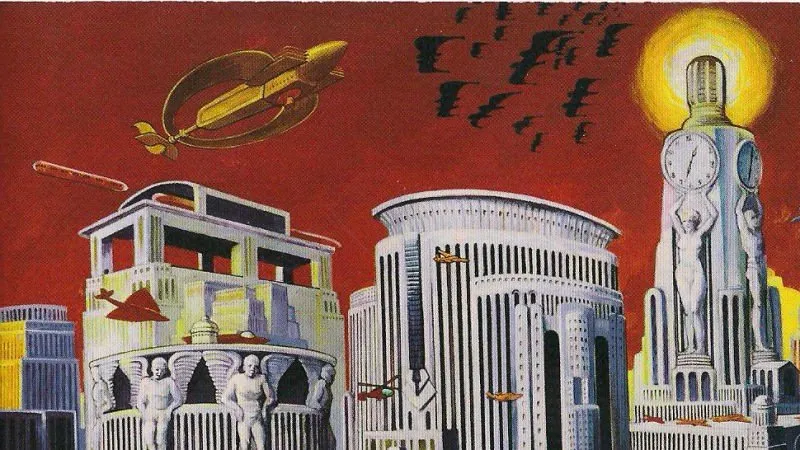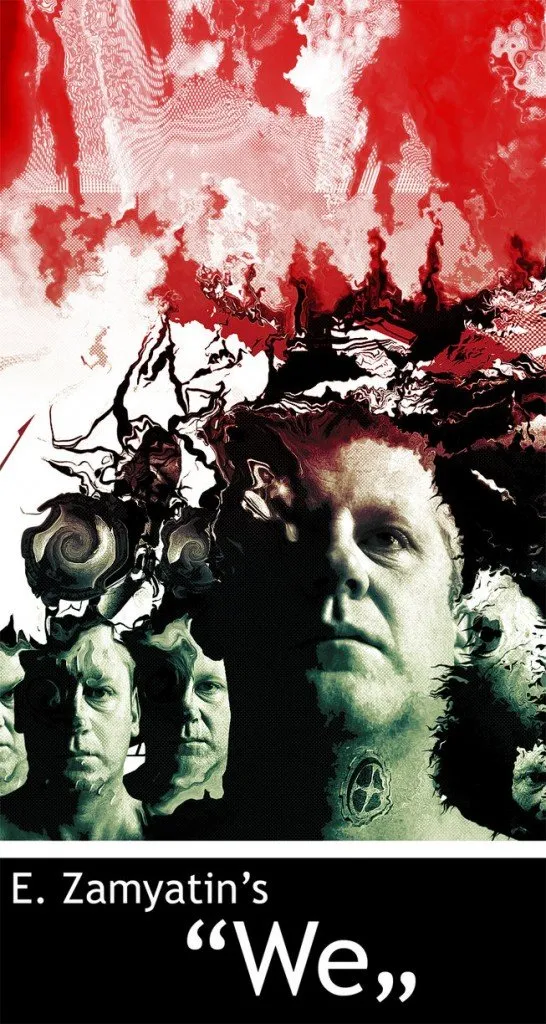Today I want to tell you about one of my favorite books - "We" written by Russian author Yevgeny Zamyatin. For me, this book is on par with Orwell "1984".

I love anti-utopian novels, I try to read everything that comes to my attention and if you have your favorite books, then please share book titles in the comments. I hope that through Steemit I will share many good books of Russian literature that you knew not only "Anna Karenina" and "War and Peace}.
The novel "We" was not published In Soviet Union: literary critics perceived it as an evil caricature of the socialist, communist society of the future. In addition, the novel contained allusions to certain events of the Civil War. The novel "We, written in 1920 was the inspiration for George Orwell (novel" 1984 ", 1949), and Aldous Huxley (novel" Brave New World ", 1932). The heyday of the genre of anti-utopia begins with this book.

The publication of the novel was delayed. Zamyatin sent the manuscript to Berlin due to the fact he was denied the publication at home. Then the novel was sent to New York. As a result of all the ordeals, the novel was published in New York in 1925 and then was published in French and Czech languages. The writer himself was severely criticized, he was refused to publish his another story. Zamyatin was able to leave the USSR in 1931. He lived in Paris until he died in 1937. The writer lived only 53 years and certainly the novel "We" became the pinnacle of his skills, despite the fact that a lot of stories came under his pen.
The most interesting is that, from the very beginning of the revolutionary movements, Zamyatin supported the Soviet regime, but it betrayed him. Last time he was mentioned in the Soviet Encyclopaedia in 1935: "The bourgeois writer, Zamyatin in his books (especially in the"The Cave "and"Godless stories") draws a picture that completely distorts Soviet reality. In the novel "We" published abroad, he viciously slanders the Soviet country."
So, let's find out what Yevgeny Zamyatin wrote, which destroyed his writing career.
Future. After a protracted war the One State was created, but it is surrounded by the Green Wall, behind which there are "savages".

There are no more names, all people are called "numbers", they smoothly shave their head and wear the same clothes. It is possible to understand a man or woman by the initial letter in the number. All apartments are absolutely identical with glass walls and a certain set of furniture. The residents have coupons for a sexual hour, which guarantees the right of any person to another to avoid attachments. Any perpetrator is executed by turning into a puddle of water. The state tried to eradicate everything from human beings. There is The Clock that measures what, how, when and for how long they will do: there is a total time of waking up, breakfast and even the number of chewing food. Life reminds Groundhog Day - everyone knows what he will do tomorrow, in a year, in a decade. Their whole life is devoted to the improvement of the world and the creation of messages for other planets.
"Yes, it is too bad. Apparently a soul has formed in you."
" A soul? That strange, ancient word that was forgotten long ago.••. "Is it •.. v-very dangerous?" I stuttered.
"Incurable," was the cut of the scissors.
The protagonist D-503 - engineer and builder of the spaceship Integral. He likes to spend his time O-90, which can not have children because her height is 10 cm below the norm. Everything changes when the D-503 meets a woman I-330. He falls in love and gets acquainted with the world of revolutionaries.
The One State is an ideal engineering world. People are gears in the debugged mechanism of the One State. If any gear is broken, it is either repaired or thrown away. The Benefactor cares for his people, gives them happiness, leads them to it. Freedom is evil because it pushes a person to commit a crime. Lack of freedom is happiness. Fantasies, dreams are a terrible disease.
What does the title "We" mean? The fact is that the concept of "I" is destroyed, there is only one organism- "We". All members of society are not so unique that they never even say "I" or "you" - always just "WE".
The novel is written in the form of a diary and because of it, the impression becomes even stronger. Thanks to the descriptions of the protagonist, we can understand his inner world. Initially, D-503 keeps his notes only so that the future crew of Integral can transfer them to the inhabitants of other planets with whom they plan to meet. But soon he begins to write about his feelings.
I will note the unusual and complex language of the narrative with "mathematical" metaphors, such as the "triangle of eyebrows" and generally frequent reference to figures. It is interesting how using forms and figures Zamyatin transmitted characters, such as O-90 - pink, round, she was soft and simple in nature.
Throughout the book, the hero's inner struggle with himself, with his convictions and principles imposed by the One State, and, of course, we'll get unexpected turns of the plot.
In general, the idea of the novel is instructive like many anti-utopias. The novel shows the life of a typical totalitarian state with all its attributes. The state is trying to do everything to keep the power and leave people unthinking faceless mass. Even when insurrections begin in the city, the authorities come up with new methods for combating them, fighting thoughts and individuality - the Great Operation. The state has even completely got rid of nature - because nature is not subject to man, it can not be so easily manipulated as people, it is violent and easier to simply shut off from it by a huge wall.
The book makes a strong impression. Personally, I had to take a rest from all that had happened.
So what will win: the mind or feelings? The end of the novel gives a fairly unambiguous answer. But it can not be that simple, right?
I think, "We" is a beautiful, unusually written and amazing book with its boldness, which must be read to everyone.
"I'm sure we will win. Because the mind must win "
The book has only 2 screen versions.
- Wir, Germany, 1982;
- The Glass Fortress. 2016, France (short-film).
I think the book is difficult enough to transfer it to the big screen. Of course, this should be a careful approach and "We" should be screened in the form of TV series.